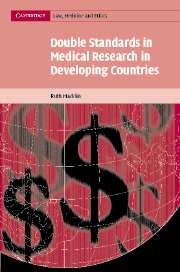Book contents
- Frontmatter
- Contents
- Acknowledgments
- 1 International research contested: controversies and debates
- 2 Maintaining ethical standards in research
- 3 Striving for justice in research
- 4 Avoiding exploitation
- 5 Providing safeguards: informed consent and review of research
- 6 Making drugs affordable
- 7 Respecting, protecting, and fulfilling human rights
- 8 Striving for a single standard
- Index
5 - Providing safeguards: informed consent and review of research
Published online by Cambridge University Press: 12 November 2009
- Frontmatter
- Contents
- Acknowledgments
- 1 International research contested: controversies and debates
- 2 Maintaining ethical standards in research
- 3 Striving for justice in research
- 4 Avoiding exploitation
- 5 Providing safeguards: informed consent and review of research
- 6 Making drugs affordable
- 7 Respecting, protecting, and fulfilling human rights
- 8 Striving for a single standard
- Index
Summary
How can human subjects of research be adequately protected against exploitation? What mechanisms exist to protect the rights and welfare of research subjects? The two main safeguards are the requirement of voluntary, informed consent of each individual research subject, and prior review of proposed research by an independent ethical review committee. Both procedures are required by US regulations and international declarations and guidelines for research. Both are discussed at length in the report of the US National Bioethics Advisory Commission and the Nuffield Council's report from the UK. Yet despite the universally acknowledged need for these two safeguards, ample evidence exists that they are at times flawed, often inadequate, and sometimes even nonexistent.
So much has been written about informed consent that it is hard to know where to begin. Even in the United States and Western Europe, both empirical studies and anecdotal evidence make it abundantly clear that a large gap exists between the ideal of informed consent to research and the reality. No one questions the need for subjects of research to be provided with information sufficient to make an informed choice of whether or not to participate. No one questions the importance of conveying that information in terms that potential subjects can understand: in their mother tongue, obviously; free of medical jargon; at a level of language comprehensible to people whose schooling has not gone beyond the eighth grade level. And everyone maintains that consent should be obtained without pressuring potential subjects and without exerting “undue influence” (the term used in the US federal regulations) or coercion.
- Type
- Chapter
- Information
- Double Standards in Medical Research in Developing Countries , pp. 131 - 162Publisher: Cambridge University PressPrint publication year: 2004
- 1
- Cited by



